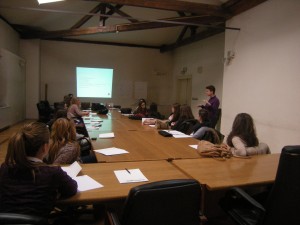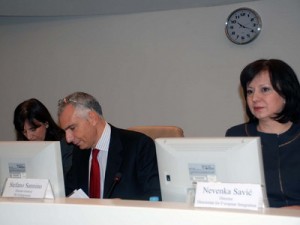In the period November 18 – 19, 2011, the Association for Democratic Initiatives Sarajevo and Youth Initiative for Human Rights in cooperation with the Law Faculty in Sarajevo and the Association of Law Students organized training for youth on the topic of discrimination.
The workshop was held at the premises of the Faculty of Law in Sarajevo. The OSCE of Bosnia and Herzegovina is also a partner of this project, which is funded by the International Organization for the Protection of Human Rights Civil Rights Defenders.
The program began with an introductory presentation of the concept of the training and the project itself by Božana Puljić, representative of the Association for Democratic Initiatives Sarajevo. The introductory part was followed by a lecture held by Una Bejtović on the topic of Public Relations and Advocacy for Human Rights: Theory and Practice. Ms. Bejtović presented to the participants the basics of PR, the content of PR propaganda, and the definition of the target groups that PR should focus on. She also explained the difference between external and internal organizations with practical clarification of concepts. The workshop ended with a press release exercise, in which participants were divided into several groups, and presented their work to other participants.
After Ms. Bejtovic’s lecture, Emin Mahmutovic’s lecture followed with the topic: Lobbying Techniques and the Path from Initiative to Change/Adoption of New Regulations. The participants gained basic knowledge of lobbying techniques and the final message of the lecturer was “believe in change.”
Lecture by Ms. Marta Valinas – Legal Advisor to the OSCE Mission to Bosnia and Herzegovina on the topic: Hate Crimes related to known cases of hate crimes and the means that police or other responsible authorities can refer to in prosecuting them . She also presented to the OSCE institution and its responsibilities.
The first day of the workshop closed with a lecture by Ms. Nina Šeremet on the topic: Legal Mechanisms in the Field of Human Rights Protection. Participants were introduced to the notion of discrimination, its origin and meaning. Afterwards, participants were introduced to specific cases of discrimination, which were primarily at the European Court of Human Rights. Ms. Šeremet then introduced the Law on Prohibition of Discrimination – the time when it was enacted, the basic principles and interests protected by the law, and the mechanisms that are a novelty.
The second day of the workshop was opened by Adnan Kadribašić on the topic: Legislation and Discrimination, Harmonization of Laws with the Principles of Antidiscrimination. Mr. Kadribašić introduced the notion of discrimination and its meaning, and extended what Ms. Šeremet touched upon at the first day of the training. The introductory part on this topic was about the adoption of the Law on Prohibition of Discrimination and its legislative procedure from the draft to the debate in the Parliamentary Assembly of BiH and the enactment of the Law in July 2009.
In the second part of the lecture, Adnan focused more on aligning the Antidiscrimination Law with other laws. However, what the lecturer considered extremely important were the causes of discrimination as well as the procedures by which discrimination could be inferred.
Mr. Sanel Huskić gave a presentation on Public Policy and Advocacy for Human Rights: Theory and Practice. Participants had the opportunity to get a clear picture of human rights advocacy at competent institutions at the level of Bosnia and Herzegovina.
He emphasized the importance of lobbying, as a core component of advocacy. Based on practical examples from everyday life, Mr. Huskić tried to get the participants closer to the problem and how they could easily and effectively carry out lobbying and advocacy. He said that changing public policy also entails political participation, and that we should not be apolitical in doing so.


